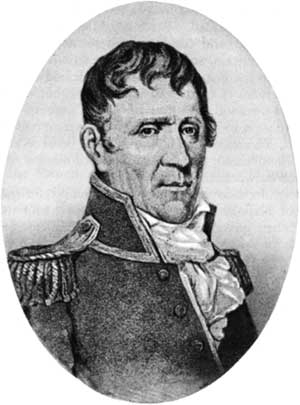|
CHALMETTE National Historical Park |
 |

Andrew Jackson as portrayed in 1815 by John
Wesley Jarvis, present at the time of the battle.
From the
collection of Stanley Clisby Arthur.
Old Hickory
Andrew Jackson came from the frontier. He was born in the Waxhaw section near the boundary between North and South Carolina on March 15, 1767. The parents of Andrew Jackson were Scotch-Irish immigrants. His father had died shortly before his birth.
Known as a boy who was always ready to fight, regardless of the size of his foe, young Jackson saw the horrors of war during the British invasion of the Carolinas in the American Revolution. At 13 he did active duty as the armed and mounted messenger for an uncle who was a major in the Continental Army. Later during this war, he lost both brothers and his mother.
Though never studious, Andrew Jackson gained admittance to the North Carolina bar in 1787. The next year he moved to Nashville, at that time a wilderness settlement beyond the frontier. He was public prosecutor for several years—a position that only a man of extraordinary nerve and courage could fill in those wild parts. In 1796, Tennessee was admitted to the Union, and Andrew Jackson was sent to the Constitutional Convention. Tradition holds he suggested the name Tennessee for the new state. Jackson was chosen Tennessee's first representative in Congress as a man popular with the people and one who would support their claims with spirit and effect. His term was short, however, as was his later service in the United States Senate. He then served as judge of the State Supreme Court for 6 years, resigning because of pressure of other affairs.
Known for his boldness in forays against the Indians, Jackson had become the militia major general commanding the western district of Tennessee in 1802. In the next 10 years, he won the loyalty of his officers and inspired enthusiasm throughout the command.
When the War of 1812 broke out, Jackson led 2,000 Tennessee volunteers on an expedition to the Gulf Coast. At Natchez, in 1813, orders came to disband the men, many of them hardly more than boys, where they would be left without provisions. Defying his official superiors and using his personal credit for supplies, Jackson held his army together and marched them back home over the Natchez Trace. His care for his men and the way he shared their hardships in the march through the wilderness gained for him the enduring nickname "Old Hickory."
Jackson's next campaign was against the Creek Indians in Alabama, then part of Mississippi Territory. He was recovering from wounds received in a "private fight" when news came of the massacre of white settlers at Fort Mims by the Creeks in August 1813. This massacre roused the frontier to fury. Jackson's personality was so commanding that, despite his wound and his bent for quarreling, he was chosen to lead the youth of Tennessee to war.
He started out with his arm in a sling. Overcoming the wilderness, the weather, the lack of supplies, and the handicap of militia who went home when their term was up, he broke the power of the Creeks in a series of battles ending on March 27, 1814, with the victory at Tohopeka or Horseshoe Bend. Later in the year, he became a major general of the Regular Army, with command of all the forces in Tennessee, Mississippi Territory, and Louisiana. The new regular major general had his work cut out for him.

|
|
Last Modified: Mon, Dec 2 2002 10:00:00 am PDT |


